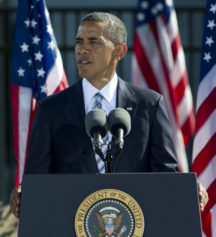As government officials comb through the background of the Boston Marathon bombers, the finger pointing has begun on Capitol Hill after lawmakers discovered that slain suspect Tamerlan Tsarnaev was listed on the U.S. government’s highly classified central database of people it views as potential terrorists.
But because the list has more than a half million names on it, authorities didn’t keep close tabs on the 26-year-old. The FBI found nothing to suggest he was an active threat, though they still placed his name on the “Terrorist Identities Datamart Environment” list. This has prompted lawmakers to blame the authorities for allowing Tamerlan to slip through their fingers.
Republican Senator Lindsey Graham blamed the FBI for not keeping a closer eye on Tsarnaev after the FBI spoke to him two years ago. Graham also told reporters the FBI should also have realized last week following the bombings that he was in databases.
“After the bomb went off, don’t you think one of the first things the FBI would do is say, ‘Have we interviewed anybody in the Boston area that may fit the profile of doing this?’ How could his name not pop up, the older brother? And when you have the photo the whole world is looking at, how could we not match that photo with him already being in the system?” Graham said.
The information on Tamerlan Tsarnaev, who was killed Friday during a shootout with police, was listed in TIDE, a database maintained by the National Counterterrorism Center. He was on the list because the FBI spoke to him in 2011 while investigating a Russian tip-off that he had become a follower of radical Islamists.
In a revelation that has proven shocking to many gun control advocates, current law won’t prevent you from buying a gun, even if a background check reveals that your name is on the national terrorism watch list. So as long as you don’t have a criminal or mental health record, you’re still free to walk out of a gun dealership with a firearm in your hands, even if the U.S. government has flagged you as a possible terrorist.
Between 2004 and 2010, people on terrorism watch lists tried to buy guns and explosives more than 1,400 times, according to the Government Accountability Office. They succeeded in more than 90 percent of those cases, or 1,321 times.
“It’s absurd that we allow people to buy unlimited AK-47s, AR-15s and Uzis, even if we feel they are too dangerous to be allowed on a plane, even after they’ve gone through a security check,” says Jon Lowy, a lawyer for the Brady Campaign, a gun control group.
But though that may sound unbelievable and illogical in a nation that supposedly has been in the midst of a decade-long war on terrorism, gun rights activists actually defend it, saying that a name showing up on the watch list doesn’t mean the person is an actual terrorist.
Michael James Barton, a White House counterterrorism official during the Bush administration, told NPR that a lot of totally innocent people end up on the terrorism watch list — such as business associates, roommates or landlords of suspected terrorists.
“Some of them are merely individuals who have proximity to terrorism suspects and are not themselves the focus of any investigation or any suspicion whatsoever,” he says.
Senator Graham said that’s why the lists shouldn’t determine whether someone should buy a gun.
“I think anyone who’s on the terrorist watch list should not lose their Second Amendment right without the ability to challenge that determination,” said Graham, who pointed out that the late Sen. Ted Kennedy showed up on the no-fly list in 2004 because a suspected terrorist was using the alias Edward Kennedy.
“We’re gonna go, ‘Boy, we’re so good, we prevented those terrorists from getting the guns.’ No, we didn’t! We prevented them from getting them from a legitimate source, where we had an opportunity to follow them,” says Richard Feldman, who heads the Independent Firearm Owners Association. “Now we don’t know if they’re ever going to get them, when they get them, where they got them.”
But in the view of gun control supporters, why not give the government the discretion to block a dangerous person on the terrorism watch list from buying a gun?
“This is yet another example of zealots on the far right of the gun movement throwing away the baby with the bath water,” says Mark Glaze, the director of Mayors Against Illegal Guns, which supports tighter gun laws.
Democratic Sen. Frank Lautenberg of New Jersey has been trying for years to close the terrorism loophole, pushing a bill that if a background check reveals a gun buyer is on the terrorism watch list, the U.S. attorney general would have the discretion to block the gun sale. But the bill hasn’t gotten any traction.
Tsarnaev was not put on the “no-fly” list that would have banned him from boarding an airplane in the United States and he was not on the Selectee List, which would have required him to be given extra security screening at airports.
But he was on the Terrorist Screening Database, a declassified version of the highly classified TIDE with fewer details about terrorist suspects.
Government agencies have declined to publicly discuss how the watch list system handled Tsarnaev, but Homeland Security Secretary Janet Napolitano disclosed some details at a separate, open hearing on immigration on Capitol Hill.
“Yes, the system pinged when he was leaving the United States. By the time he returned, all investigations – the matter had been closed,” Napolitano told the Senate Judiciary Committee on Tuesday.
Officials have disclosed that Tamerlan Tsarnaev and his family were living on taxpayer-funded state welfare benefits as recently as last year, according to the Boston Herald. He was receiving benefits along with his wife, Katherine Russell Tsarnaev, and their 3-year-old daughter.


